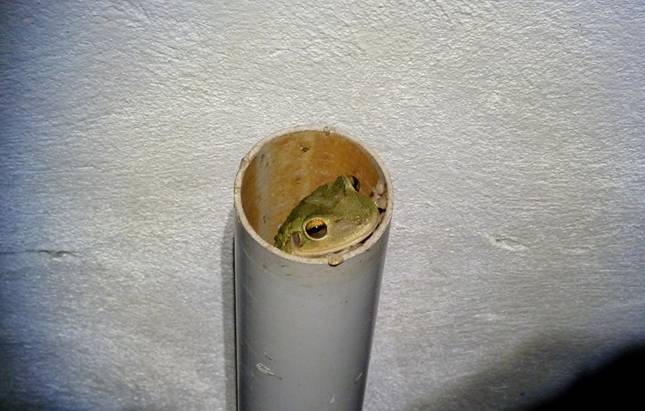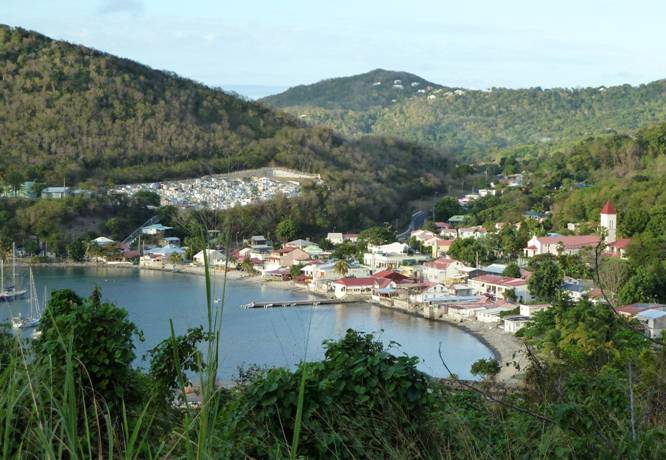A Royal visit

|
16:13.55N
61:32.06W It was cold, very cold. Flurries of snow flew into the air. We turned up our collars but the wind took no notice. The chilled air seemed to pass straight through our gloves and clothing, stiffening our fingers and making it hard to grip our tools. No, not out in the Caribbean, but back in Blighty this time, where we had discovered a small drainage problem! Our gutters were overflowing because of a blocked soakaway, but where was it to be found? No plans of the ancient drainage system existed. So we chipped away at the frozen earth with spades and picks and dug a series of exploratory ‘laparotomies’ across the garden. At last we struck gold, or at least the pile of old rubble that had served as a soakaway until, choked by decades of silt from the slate roof, it had finally given up the ghost.
Our next task was to fill a large skip with earth and rubble. The natural consequence of all of this effort was to leave a very large hole in the ground. At this stage Stella was politely asked to stop digging before either being unable to climb out or reaching Australia. And into the abyss went the modern version of a soakaway - half a dozen plastic crates. It worked. Or at least there wasn’t enough rain to disprove this hypothesis. Time passed too quickly, lost in a flurry of social activity. It was just great to see family and friends once more. *
*
*
*
*
Back in Antigua, things are definitely hotting up. A stiff 4 hour sail to windward had bought us to Falmouth harbour where there is a buzz about the place. Preparations are in hand for a Royal visit. At Nelson’s Dockyard, there are gardeners everywhere. Lawns are pristine, edged by new attractive chain and post fences, and potted plants sprout up on every corner.
Stellie finds friendly
company in the loo at a Falmouth Pizzeria.
We are expecting Prince Harry, who we hear has been on an official tour of the Caribbean including Jamaica.
But when the door of the (rented) Royal yacht finally opens and the VIP descends the gangplank, he appears to have rather less hair than we remember. It is in fact Prince Edward who steps onto the pontoon to tread the specially laid red carpet, accompanied by Sophie!
The band strikes up, their white uniforms resplendent in the
bright sunshine. But to my trained
ear, something about the music is not quite right. Is something missing? I look behind me and all becomes
clear. Standing there, clutching
his instrument, is one very out-of-breath alto saxophonist . But it’s too late. He is shaking his head and looking most
embarrassed. Can’t you just feel
it? Your one big day and you don’t
manage to get out of bed in time…
Oorl right
squad – which one of you forgot to turn off his mobile
phone?
‘Thanks
Sophie, but doesn’t one’s gardener usually do this sort of
thing?’ The rest of the day continues in a surreal way. We chat to the owner of a very large
superyacht. He has just had lunch
with the Prince, and tells us about his charitable foundation, now funded to the
sum of £53m.
Then we are honoured to be invited by Oyster 56
‘Sulana’ owners Alan and Sue for evening drinks at the Antigua Royal Naval Tot
Club. This most unusual institution
was once described by one yachting magazine as ‘the second most prestigious
yacht club in the world’. Members
and guests are obliged to drink a rather generous toast to the queen after a
reading of extracts from British naval history. Not surprisingly, the readings all date
from around the time of Nelson’s victory over the French and Spanish fleets at
Trafalgar on 21st
October 1805!
The Tot Club is involved in raising funds for charitable causes too. It promotes Antigua in the yachting sector and clears trails through the National Park - fighting back the tropical undergrowth from Antigua's historic monuments. Thanks Alan and Sue for such a fascinating experience!
The trip to Green Island is another windward bash into big seas, but it’s worth it – the anchorage is pretty and unspoiled, tucked away up a narrow passage behind a coral reef. The surf pounds on the coral; it’s all that protects us from a swell that builds up as the wind blows unabated across thousands of miles of Atlantic Ocean. We are safe there, and watch the kite surfers skilfully sail at high speeds through the relatively smooth water of the anchorage. Sometimes they take off and fly considerable distances. But for some, even these thrills aren’t enough. Lacking any kind of self preservation gene, some even surf at night, their boards and kites faintly illuminated by tiny LEDs. They’re obvious contenders for ‘Darwin awards’, given posthumously to those who remove themselves from the gene pool in adventurous, interesting but ultimately reckless ways. At last - our next sail, to the French island of Guadeloupe, isn’t hard on the wind. It’s a glorious close reach, perfect conditions for a fast passage, and we anchor in the picturesque bay of Deshaies. Here we met old friends Craig and Karene on Oyster ‘Il Sogno’ and enjoy exploring the wonderful river gorge with them. We swam in many rockpools before finally reaching the source – an impressive rock canyon, festooned with jungle creepers and tropical plants and trees. Craig spent many years as a photojournalist for NBC, and kept us spellbound with tales of his experiences in reporting events from around the world. This included revisiting the canyon where, after 5 days stuck under a boulder in a canyon, a trapped climber who had carved his own epitaph finally escaped by cutting off his own arm with a blunt penknife. Fortunately we made it back down again without recourse to any surgery.
Deshaies, Guadeloupe. The interesting collection
of small huts above the town is actually a cemetery containing many
mausoleums. With a live volcano towering to 5,000 feet, one might expect the western coast of a high island like Guadeloupe to be pretty sheltered from the prevailing easterly winds. But in fact the mountains act like a giant wind sock, funnelling the wind down to the harbours below. This quirk of geology produced gale force winds of up to 38 knots that buffeted us as we sailed southwards. The wind howled relentlessly, producing almost by reflex the anxiety that most sailors experience in strong conditions. But we still managed to anchor for a night off Pigeon Island in the Jacques Cousteau National Park where we found a good variety of fish, coral and sea sponges, all in crystal clear water.
Sailing ship
Star Clipper anchored
behind us at Deshaies So it was with some relief that we escaped the ‘roaring thirties’ and sailed around the bottom of the left wing of the butterfly shape that is the island of Guadeloupe, and then headed NE to the calm port of Pointe-a Pitre. Though not its capital, this is Guadeloupe’s major town and boasts a University and Medical school, both run in conjunction with Guyana. The roads are well built and very busy. Although home to the French yachting community and with good facilities for yachtsmen, sadly the port looks like it has seen better days. Many shops are closed; the recession must have hit the town badly.
Cascade aux
Ecrevisses,
Guadeloupe But the countryside is tropical and lush and the French have laid out fine national parks with well marked paths. We hire a car and drive across the island through an attractive windy mountain pass. There are wonderful rainforest walks under a magnificent tall canopy with rivers and waterfalls.
Sentier de
la maison de la
foret * * * *
* |










